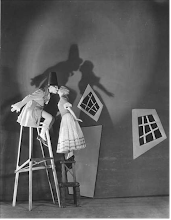Thursday, September 24, 2009
On the Theme of the Traitor and the Hero
I must agree almost entirely these ideas (I say almost entirely rather than entirely because that would just be a self inflicted, foolish verdict). The fieldwork I have done to come to such conclusions is based on simple observation and reading. If you take all the stories mentioned in this story by Borges and apply them to each other, you have evidence. Take history, any event, as singular as it may seem, and it still reinvents itself as time goes by. Men and women function in cycles, the world functions in cycles and the earth cycles around the sun, and this process is blown to infinite repetition. If this is not enough, I think of smaller slices of reality, like the ages of a human, who is more similar than a child and an elder? But I guess coming to such conclusions from this story is drifting away too far. I am just genuinely interested in the adaptation of this piece, and in seeing how these concepts of the story are translated to the screen.
Thursday, September 17, 2009
On The Devil's Drool
My points of view will surely be very affected after watching the film “Blow-Up”, but there are a few thoughts that roamed through my mind after reading “The Devil’s Drool”, by Cortazar. First I have to say as a sort of a disclaimer, as a back door or a escape route that, above all my meager opinions, is my devotion to art and truth, so as long as the artist is acting sincerely and attempting to express a certain degree of truth, all else is freedom. I think that the essence of the piece is what should remain immaculate when adapting literature to film; if this is not the case, then one might as well create something different, or not call it an adaptation at all, given that by the term adaptation we are directly implying that it is that very piece, that short story or novel (with inevitable technical differences), that we want to take to the screen. Of course there must be freedom of expression for the filmmaker, but the essence should remain untouched.
Cortazar’s story is fantastic and evidently very cinematic. I am particularly fascinated by his interest in stopping time, his idea of how a photograph is a minuscule slice of time. Not only that, but how time can be figuratively malleable, taken around in circles, stopped, captured and even transposed. Especially at the end, when he is staring at the blown up picture, his way of approaching the story is surreal. He meddles with the characters own perception of reality, which ends up being absolutely necessary for the completion and full understanding of the story.


